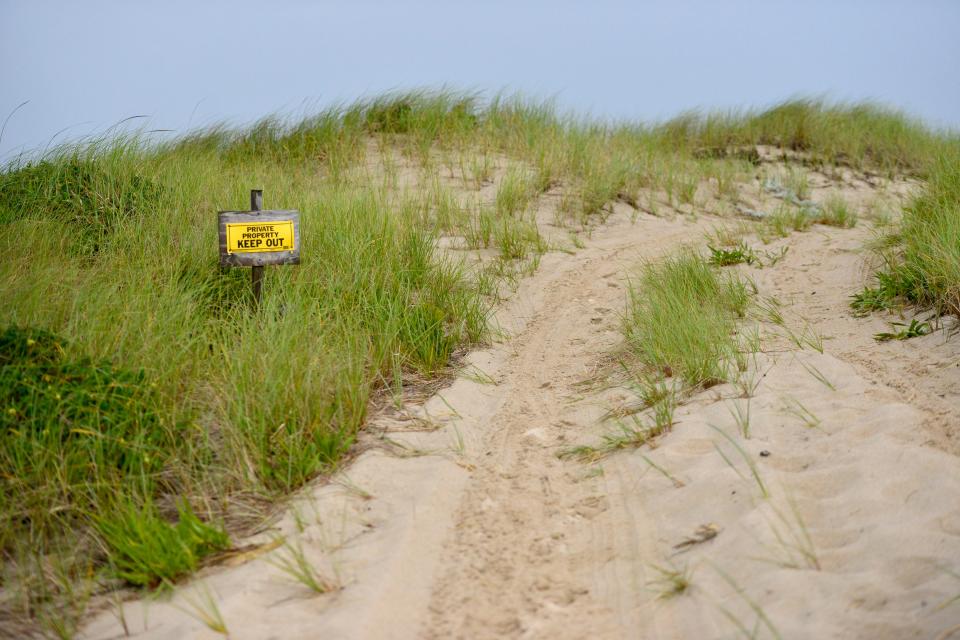Dune shacks, beach parking, water quality: Seashore commission hears from Cape Cod towns
EASTHAM — Finally.
That was the word from Congressman Bill Keating as he spoke via Zoom to members of the Cape Cod National Seashore’s reauthorized Federal Advisory Commission meeting on Monday.
The nine-member commission hasn’t met in more than five years. The priority for Monday’s agenda was getting representatives from Eastham, Chatham, Orleans, Provincetown, Truro, Wellfleet, Barnstable County and the Mashpee Wampanoag Tribe to share their top concerns for future discussions.
The items that came to the top of the list included water quality issues, housing, and climate change. Fire prevention and management was a common concern. More locally were issues surrounding parking, the dune shacks and the Herring River restoration project.
After a 3 1/2-hour meeting, with a break to observe the eclipse, the commission decided on four future meeting dates: July 1, Aug. 5, Sept. 9 and Oct. 7. The broad agendas for the next two meetings include zoning issues, water quality and the Provincetown dune shack lease agreements in July, and fire safety, fire prevention and terrestrial management in August.

The members agreed that Superintendent Jennifer Flynn has the authority to add additional agenda items to the Federal Register, should issues come up between meetings.
Chairman Richard Delaney, who represents Secretary of the Interior Debra Haaland, said he was excited to get back to work with commission members and Superintendent Flynn who took over at the Seashore in November, after the departure of Brian Carlstrom.
Flynn gave an update on projects being carried out on the Seashore. But this meeting was mostly a chance for representatives to share their concerns in a forum they haven’t had access to in more than five years. Flynn listened, took notes and, towards the end of the meeting, addressed some of the concerns raised. Meetings aren't the only way towns have access to us, she said.
What is the role of the Cape Cod National Seashore federal Advisory Commission?
Revisions have been made to the commission's charter, shortening its purpose, Delaney said. Commission members will no longer provide advice on recreational or commercial use of property on the Seashore.
“We’re going to be reasonable on non-covered items on a case-by-case basis,” he added.
Top concerns from Cape Cod representatives
Some of the top concerns listed by the representatives were as follows:
Chatham (Thomas Dougherty): Beach erosion and non-lethal measures to scare predators threatening piping plovers.
Eastham (David Crary Jr.): Parking for Eastham residents at Seashore beaches, water quality, and natural resources management, including beach erosion and management of upland areas.
Provincetown (Mary-Jo Avellar): Avellar had a long list of town concerns, including the leases between the town and the Seashore for the airport and landfill, the need to improve the relationship between the dune shack dwellers and the Seashore, damaged by last year's lease renewal protocols, and coastal erosion
Wellfleet (Lilli-Ann Green): Mosquito permitting in light of the overwash at Duck Harbor and the Seashore's clearing at High Toss Road where culverts have been clogged by mulching, fire safety and prevention, land swaps, broadband permitting and the Herring River Restoration project.
Orleans (Lawrence Spaulding): Spaulding said the issues impacting each of the six towns impacted all of the towns, but his primary concern is maintenance of town beaches vs Seashore beaches.
Truro (Susan Areson): Water and wastewater, particularly in regard to development of the Walsh property and the possible siting of a wastewater treatment plant nearby. The need for a water tower and new well sites to account for increasing development, housing and the maintenance of fire trails.
Barnstable County representative (Sheila Lyons): Sea level rise, preparation for possible mosquito problems due to the over wash at Duck Harbor and High Toss Road area in Wellfleet, fire training and ensuring communication is clear and ongoing with the public.
Mashpee Wampanoag Tribe (Leslie Jonas): Consultation between the Seashore and the tribe regarding historical sites, tribal access to natural resources and land, and building a relationship with the Woods Hole Oceanographic Institute to support and revisit issues surrounding piping plovers, climate change, and loss of seagrass.
Denise Coffey writes about business, tourism and issues impacting the Cape’s residents and visitors. Contact her at dcoffey@capecodonline.com .
Thanks to our subscribers, who help make this coverage possible. If you are not a subscriber, please consider supporting quality local journalism with aCape Cod Times subscription.
This article originally appeared on Cape Cod Times: Seashore group restarts after 5 years. Here's what they want to do.

